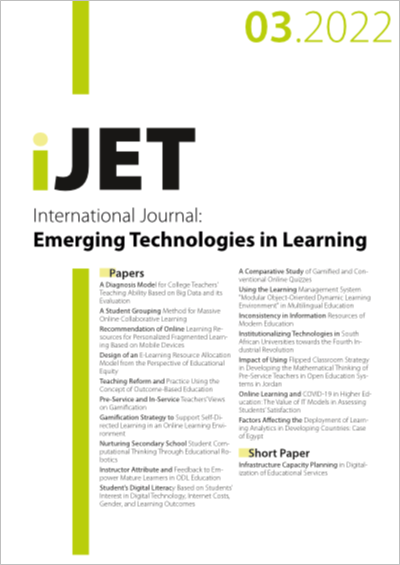Institutionalizing Technologies in South African Universities towards the Fourth Industrial Revolution
DOI:
https://doi.org/10.3991/ijet.v17i03.25631Keywords:
Higher Education, Fourth Industrial Revolution, South AfricaAbstract
This study investigated the essentials for institutionalizing technologies for teaching and learning across the three types of universities in South Africa. This was with a view to determining the skills required for teaching and learning in the 4IR era. In order to obtain the data needed for the study, cross-sectional survey design was employed and online interview was conducted on Microsoft Teams and Zoom with the participants to elicit first-hand information. The population consisted of all the Executive Deans/Deans of Faculties in twenty-six (26) South African Universities. A total of twenty-two (22) Universities were purposefully selected to allow fair representation to make the findings generalizable. Seventy (70) Executive Deans/Deans participated in the online data collection via Microsoft Teams and Zoom. Content analysis and descriptive statistics were employed for analyzing data. Findings revealed that the universities in the Republic deployed fifty-seven different technologies to facilitate their teaching and learning activities, and teaching platforms had been supplemented with new technologies such as WhatsApp, Zoom, and MS Teams. Although resistance had been experienced in the past, the teaching staff is competent to moderately competent in the use of existing technologies for teaching because most faculties had provided training in an on-going basis. Improvements in the standard and quality of teaching and learning were observed with the aid of emerging technologies. The study concludes that while Universities are settled to adopt blended learning as the strategy to implement the convergence between human and machines in the era of the fourth industrial revolution, there is a need to have a national policy in place that deals with funding (special grant) to plug the gap on the digital divide.
Downloads
Published
2022-02-18
How to Cite
Moloi, T. S., & Salawu, M. K. (2022). Institutionalizing Technologies in South African Universities towards the Fourth Industrial Revolution. International Journal of Emerging Technologies in Learning (iJET), 17(03), pp. 204–227. https://doi.org/10.3991/ijet.v17i03.25631
Issue
Section
Papers
License
Copyright (c) 2022 Tankiso Steven Moloi, Mary Kehinde Salawu

This work is licensed under a Creative Commons Attribution 4.0 International License.



